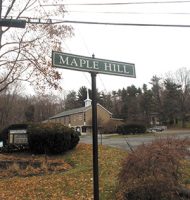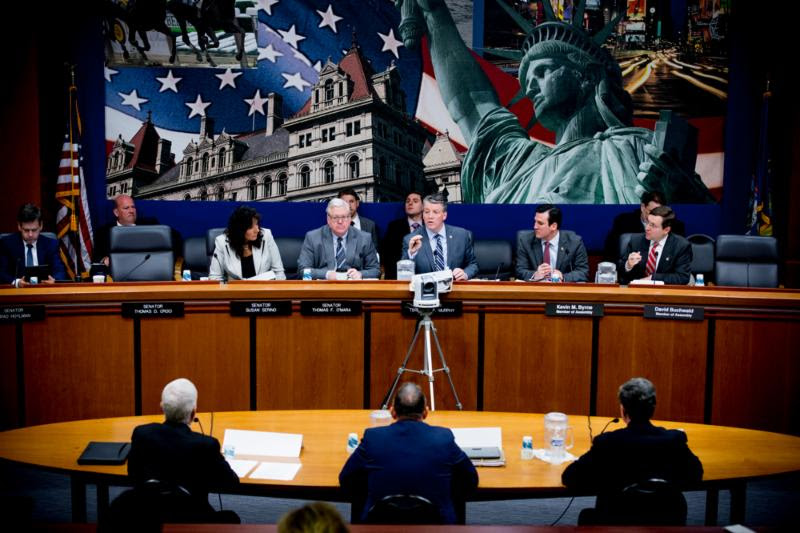Sunrise Abandons Senior Facility Proposal in Pleasantville

Sunrise Senior Living officially pulled the plug last week on its proposed senior facility at the United Methodist Church site in Pleasantville, about two weeks after its representatives failed to show for a Village Board meeting.
Jerry Liang, Sunrise’s senior vice president of investments and development, informed the village last Friday that the company has decided to look for development opportunities elsewhere.
Sunrise’s proposals, first for an assisted living facility and most recently for 55 memory care units, were met with stern opposition by neighbors on Maple Hill Road and at Foxwood Condominiums. It was unable to gain support from the Village Board for the needed zoning change.
“After more than two years of working with the town of Pleasantville and its residents to listen and address their feedback, we have made the very difficult decision to no longer pursue our plan for a new community,” Liang said in a statement. “We remain committed to exploring opportunities to meet the need for high-quality senior care in Westchester County, and thank Mayor (Peter) Scherer, the Trustees of the Board and Pleasantville neighbors for their time.”
Despite the cordial statement, the company’s decision comes after a periodically strained relationship between Sunrise and the board, raising questions about whether the company received a fair shake.
During a well-attended Nov. 27 work session, Liang pitched the smaller 55-unit memory care facility over the originally proposed 79 units of assisted living. The structure would have required less parking with fewer impacts and an increased buffer for Maple Hill residents, according to Sunrise’s representatives. For the project to have moved forward, it needed the Village Board to approve a new floating overlay district.
Following the November presentation, Scherer said the board would need a couple of weeks “to digest” the proposal and would provide feedback at its Dec. 11 meeting. On Dec. 11, several letters from residents were submitted into the public record, otherwise the project wasn’t discussed.
Scherer said at that time that trustees would respond to Liang once the board “had a chance to digest” the information. No public discussion by the board occurred after that.
However, a source told The Examiner that a few days before the Mar. 12 meeting, Scherer told Liang in a phone conversation that there was strong board opposition to the project and that Sunrise had no realistic chance of gaining approval for its zoning change.
Scherer, who often compared the Sunrise project to the failed Benchmark Senior Living application for an assisted living community, declined to comment on whether that phone conversation took place.
In 2014, Scherer and Trustee Steven Lord cast the dissenting votes on the controversial Benchmark proposal to rezone the church’s property for an 87-unit assisted living facility. Neighbors opposing that application had submitted a valid petition requiring four votes in favor of a zoning change from the five-member board.
Former trustee Colleen Griffin-Wagner, whose term ended Mar. 31, said last week she had no knowledge of Scherer’s conversation with Liang. However, she charged that Sunrise wasn’t treated properly.
“It’s not been handled well,” said Griffin-Wagner, who was the board’s lone remaining supporter of the project. “This is not the way it’s supposed to work. There are very rigid rules on how this stuff is supposed to be talked about and that conversation should not have gone on.”
Trustee Nicole Asquith said she didn’t know why Sunrise was absent from the Mar. 12 meeting but doesn’t believe it was because Scherer “decided to scare them away.”
After weeks of silence, several attempts were made to get Sunrise on an agenda, according to the source, who requested anonymity. On Jan. 30, Liang e-mailed Scherer and former village administrator Patricia Dwyer, requesting to meet with the board.
“We had requested to hear from the board their views based on our presentation of a smaller building once they’ve had a chance to digest,” Liang e-mail’s read. “Now that we are almost through January, I’d like to request a meeting so we can receive any comments and figure out how to proceed.”
Frequent phone calls to Dwyer had also been made to see if Sunrise could be placed on the agenda.
Scherer said he suggested Sunrise make a presentation at the Mar. 12 meeting, a televised meeting. He explained it would have given the community an opportunity to familiarize itself with the proposal and the board a chance to review the requested zoning change.
But Sunrise didn’t care to make another presentation and was only interested in receiving feedback from the board based on its November appearance. It was after Scherer’s conversation with Liang that Sunrise no longer cared to expend more resources on a project that had no chance of approval.
Sunrise had “been living a fantasy” thinking it could get a fair shake, the source told The Examiner.
Asquith, Griffin-Wagner and Trustee Joseph Stargiotti each said last week they did not know why Sunrise didn’t appear on an agenda until the Mar. 12 meeting. Asquith said delays often happen with applicants, while Stargiotti said it wasn’t the village’s responsibility to follow up.
“They’re a potential applicant,” Stargiotti said. “If they want to move forward they have to do it.”
Griffin-Wagner said there was confusion about when Sunrise would return. She said conversations regarding Sunrise had been very tight-lipped and that Scherer and the village administrator had decided what would be placed on agendas with little input from trustees.
“I feel badly because I’ve been such a proponent of this and I didn’t do more to facilitate a meeting. I didn’t do my due diligence towards Sunrise and I regret that,” Griffin-Wagner said. “Shame on me for not taking more of a position on this, especially because I believe in it. I let the process go the way it’s always gone.”

